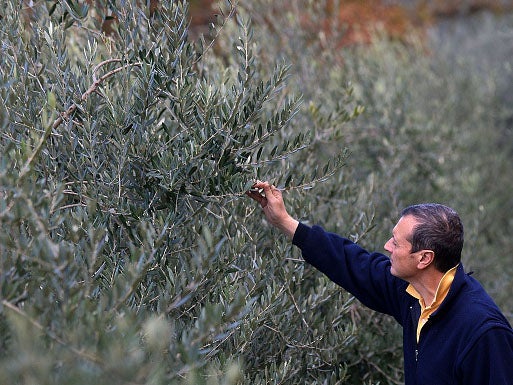Spain and Italy hit by devastating 'olive ebola' outbreak
There is no cure for the disease, which causes 'olive quick decline syndrome', and all affected trees must be felled

Your support helps us to tell the story
From reproductive rights to climate change to Big Tech, The Independent is on the ground when the story is developing. Whether it's investigating the financials of Elon Musk's pro-Trump PAC or producing our latest documentary, 'The A Word', which shines a light on the American women fighting for reproductive rights, we know how important it is to parse out the facts from the messaging.
At such a critical moment in US history, we need reporters on the ground. Your donation allows us to keep sending journalists to speak to both sides of the story.
The Independent is trusted by Americans across the entire political spectrum. And unlike many other quality news outlets, we choose not to lock Americans out of our reporting and analysis with paywalls. We believe quality journalism should be available to everyone, paid for by those who can afford it.
Your support makes all the difference.Spanish olive groves are at risk of being wiped out by a strain of “olive ebola” which has ravaged the crop in Italy.
The bacteria Xylella fastidiosa, believed to have originally come from the United States, has torn through southern Italy since it first appeared in late 2013.
Dubbed “olive ebola” by a Blanca Landa, a researcher at the Institute of Sustainable Agriculture, is threatening to wipe out decimate entire groves across southern Spain.
Landa told Spanish daily newspaper ABC: “The Italian outbreak is very virulent. The bacteria’s virulence in olive trees is unprecedented.
"It is unforgiving. The Italian farmers we met told us they had taken better care of their olive groves than their children and now they are irrevocably damaged. In barely a year it can wipe out an entire plantation.”
It is causing serious concern for Spanish officials as Spain is the biggest olive oil producer in the European Union.
There is no cure for the disease, which causes "olive quick decline syndrome", and all affected trees must be felled.
At the end of April when the EU’s agriculture body, Standing Committee on Plants, Animals, Food and Feed (Paff) asked Italy to cut down its affected trees to stop the disease spreading further.
Italian authorities will now be required to test all olive trees in a 20km zone adjacent to affected areas, Brindisi and Taranto.
If any places test positive, all olive crops within a 100m radius must be destroyed.
But these harsh measures have been criticised by Roberto Moncalvo, the president of Italian agricultural group Coldiretti.
He told The Local website in Italy: the destruction of Italian olive groves could “cause unacceptable economic and environmental damage” and wipe out “hundreds of years of history”.
Join our commenting forum
Join thought-provoking conversations, follow other Independent readers and see their replies
0Comments